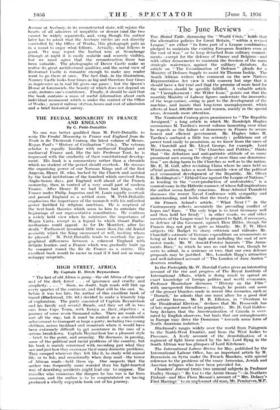THE FEUDAL MONARCHY IN FRANCE AND ENGLAND By C. Petit-Dutalllis
No one was better qualified than M. Petit-Dutaillis to write The Feudal Monarchy in France and England from the Tenth to the Thirteenth Century, the latest volume of Messrs. Regan Paul's "-History of Civilisation" (15s.). The veteran scholar is equally familiar with mediaeval England and mediaeval France and, like the late Professor Tout, he is impressed with the similarity of their constitutional develop- ment. His book is a commentary rather than a chronicle which no student of the period should overlook. He stresses the organising power of our Norman Kings and of the first Angevin, Henry II, who, backed by the Church and assisted by the local institutions of the hundred which survived from Anglo-Saxon days, put England well ahead of the French monarchy, then in control of a very small part of modern France. After Henry II we had three bad kings, while France under Philip Augustus and St. Louis rapidly overtook and pained England as a settled state. M. Petit-Dutaillis emphasises the importance of the monarch with his unlimited Power. fortified 'by religious sanctions. He is sceptical of the text-hook theories Which seem to him to antedate the beginnings of our representative constitution. Ile confirms a widely held view when he _minimises the importance of Magna .Carta, except as a legend to which Stuart Parlia- mentarians could appeal. A.s for De Montfort, after his death Parliament reniained little more than,the old feudal asseMbly which the King summoned:at will, inviting whom he pleased." M. Petit-Dutaillis tends to overlook the, geo- graphical differences between a coherent England with definite borders and ,a France which was gradually built -up by conquest round.' the -ne de France as a centre. His excellent book would be easier to read if it had not so many unhappy misprints.














































 Previous page
Previous page